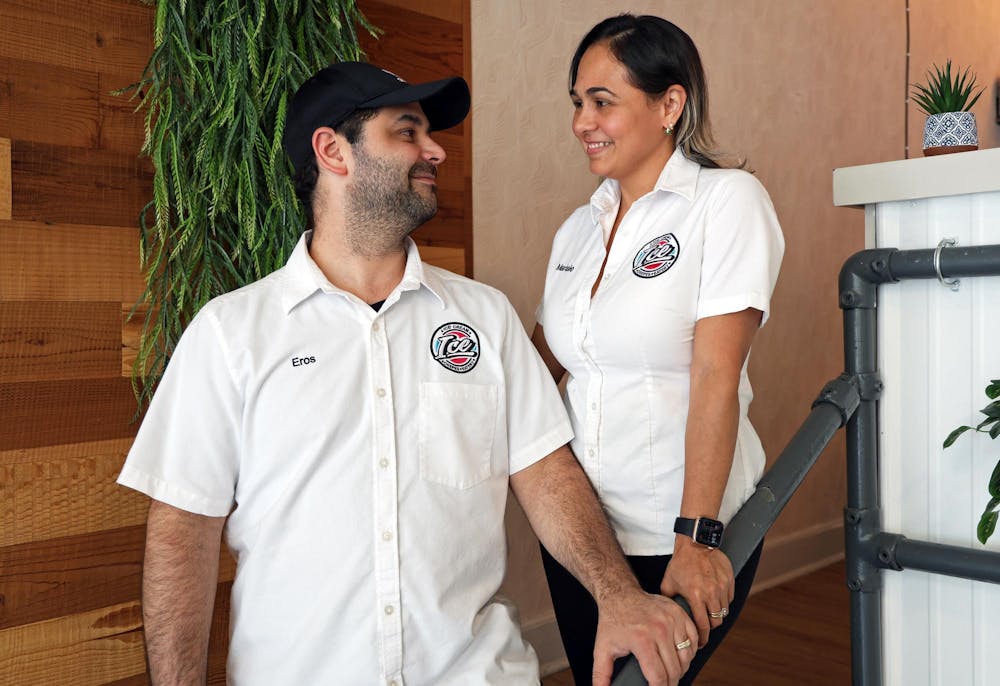To most of her customers, Maria Alejandra Puentes is known as La Maracucha, but the nickname is much more than a nod to her hometown — it’s a dream, a family legacy and a responsibility she carries with honor.
Maria Alejandra, who also goes by Mariale, has a talent for cooking traditional Venezuelan food rooted in the flavors of her home of Maracaibo, just like her mother taught her. What began as a way to reconnect with her culture evolved into an actualized dream that sits on years of hard work.
“I am very shy, but it gives me a lot of pride when they call me ‘Maracucha,’” Mariale said.
The restaurant owner and cook said it fills her with a sense of pride knowing people leave her restaurant happy and satisfied after eating one of her meals.
Mariale met her husband, Eros Puentes, after moving to Miami and working in the same hotel. The seed for the business was planted eight years ago in 2017. She prepared hot meals for her coworkers, who fell in love with her cooking. It wasn’t long before her coworkers were willing to buy the meals.
With Eros’ support, that selling spirit sailed into her dream restaurant, La Maracucha.
To get away from the hectic hustle and bustle of Miami, the couple moved to Gainesville in 2020. It kickstarted their new project — opening a food truck. Mariale cooked, and Eros, the general manager, did the accounting. Their secret weapon, Mariale’s mother, aided with their cuisine.
Parked in front of an Ace Hardware, the food truck faced some obstacles. Some nearby vendors were friendly and even became customers, while others shut them out because they took up parking spaces, Eros said.
The family seized an opportunity to open a brick-and-mortar restaurant in 2023 on West University Avenue.
Securing a permanent location was made possible by a regular, who offered his space because he was moving to Texas, Eros said. The pair agreed to take over his lease.
La Maracucha sells a full Venezuelan menu, an assortment of crepes and ice cream.
It’s the best of both worlds.
He said he didn’t know what a crepe was until they bought the place. Now, he claims he’s gotten pretty good at making them.
“It’s so good when you love what you sell,” Eros said.
The summer lull
In the slower summer season, having a variety of products gives the restaurant another selling point. However, sales still prove tough.
“There’s just no other way to do it,” Eros said. “We have to reduce the hours.”
They switched to a reduced summer schedule, opening at 11 a.m. instead of 7 a.m. and closing at 10 p.m. rather than midnight.
The shop’s proximity to UF’s campus means many of their regulars are students. When they leave for the summer, it’s a big lull in business, Eros said.
“When students or customers leave, my employees leave as well,” he said.
Despite rising prices of food, like beef or oil, rent, electricity and fewer sales, Eros said he sticks to the original pricing. Being Cuban, he said he understands the importance of keeping food accessible to customers.
“I see other Venezuelan restaurants, they keep going higher and higher,” Eros said. “Sometimes they make more money, but there’s a lot of people that notice, and they’re not happy about it.”
Creating community
During a shift, Eros overheard a regular and a newcomer mingle over their Colombian accents in the store. The pair bonded over their culture despite being from different generations, he said.
He attributes the influx of new customers to the word of mouth of the Latino community who’d visit from their food truck days. Spreading the word builds trust, he said, which can’t be replaced by an Instagram ad. The community’s interaction is essential to business.
Eros said he’s fostered a symbiotic relationship with the Gainesville community. Amid news about Venezuela and Cuba, he said English-speakers ask curiously and “listen passionately” when he talks about his culture.

“They like my stories a lot,” he said.
Mariale shares the feeling. When she first moved to Gainesville, she didn’t find many Latinos.
“Maybe a year in, you would go to Walmart and suddenly hear somebody speaking Spanish,” she said. “Little by little, that community began to grow.”
She said Colombians, Puerto Ricans, Mexicans and all kinds of Latinos visited her food truck looking for a familiar flavor, even if they weren’t Venezuelan.
“Their support was a lot,” she said. “It was the push.”
Roadblocks
Mariale prides herself on her fresh and traditionally made food. But there are only two chefs in the kitchen, her mother and herself. While another employee plates their dishes, it can prove difficult when customers line up.
“Starting is always hard,” Mariale said. But she refuses to sacrifice quality. The flavor stays in the family, she said.
In order to get the best flavors, she sources her meat from Miami, which entails a three-day trip to South Florida. Depending on the season, supply and demand prompt an added business expense nearly every month.
She also struggles balancing being a business owner, cook, wife and mother to her 5-year-old with autism. It’s very draining and means sacrificing vacations or days off for the business, she said.
But she believes it’s worth it, she said. Knowing what it’s like to leave a country and its customs and adapt to a new one, Mariale understands the desire to feel at home.
“It fills both me and my mom with excitement to prepare food that [makes] people feel happy,” she said. “We make it with a lot of love.”
A taste of home
Isabel Velasco, a 21-year-old employee at La Maracucha, said she found the food truck when she first moved to Gainesville to study at UF. Growing up with Venezuelan parents and leaving her hometown of Miami, she said she missed being around Hispanic people. She was a customer for a year before working for the Puentes’.
“I first saw La Maracucha food truck, and I was immediately, like, ‘Yes, this is my place,’” she said. “So, I just started coming here all the time.”
“I’m attached to this place,” Velasco said. ”They [the owners] remind me of my family back home.”
In comparison to other Venezuelan restaurants, La Maracucha feels more intimate.
“Everything is made with so much thought,” she said.
Isabella Tang, a civil engineering student, said she was able to connect with another culture through the food. Originally from Hong Kong, the first-time customer was drawn in by a sign advertising empanadas, a dish she tried once while in Panama.
“I like the atmosphere here,” Tang said. “You feel like you're at a friend’s home.”
The spaciousness, the decorations and overhearing Spanish conversation contributed to that homey feeling, she said.
Huheily Hernandez, a 31-year-old Gainesville resident and Walmart employee, dined in with 30-year-old Dairo Ortiz, a fellow Walmart delivery driver who recommended the place.
Hernandez said she and Ortiz would go to the food truck every Sunday because Ortiz loves the soup.
She’s tried a bit of everything and loves all the food, from the pastelitos to the empanadas and tequeños, she said. From her frequent visits, she’s gotten to know the owners as friendly people.
She emphasized the importance of supporting immigrant-owned businesses and Latin owners like the Puentes’. It creates the opportunity to eat food from her land, she said.
Eating at La Maracucha feels like “being in Venezuela again, eating arepas,” Hernandez said.
To owner Maria Alejandra, she said reactions like that let her dreams come to life.
Contact Allison Bonnemaison at abonnemaison@alligator.org. Follow them on X @allisonrbonn.
Allison is a journalism and international studies sophomore. She is the Summer 2025 food reporter at The Avenue. In her free time, she enjoys drawing and finding new music to listen to.






